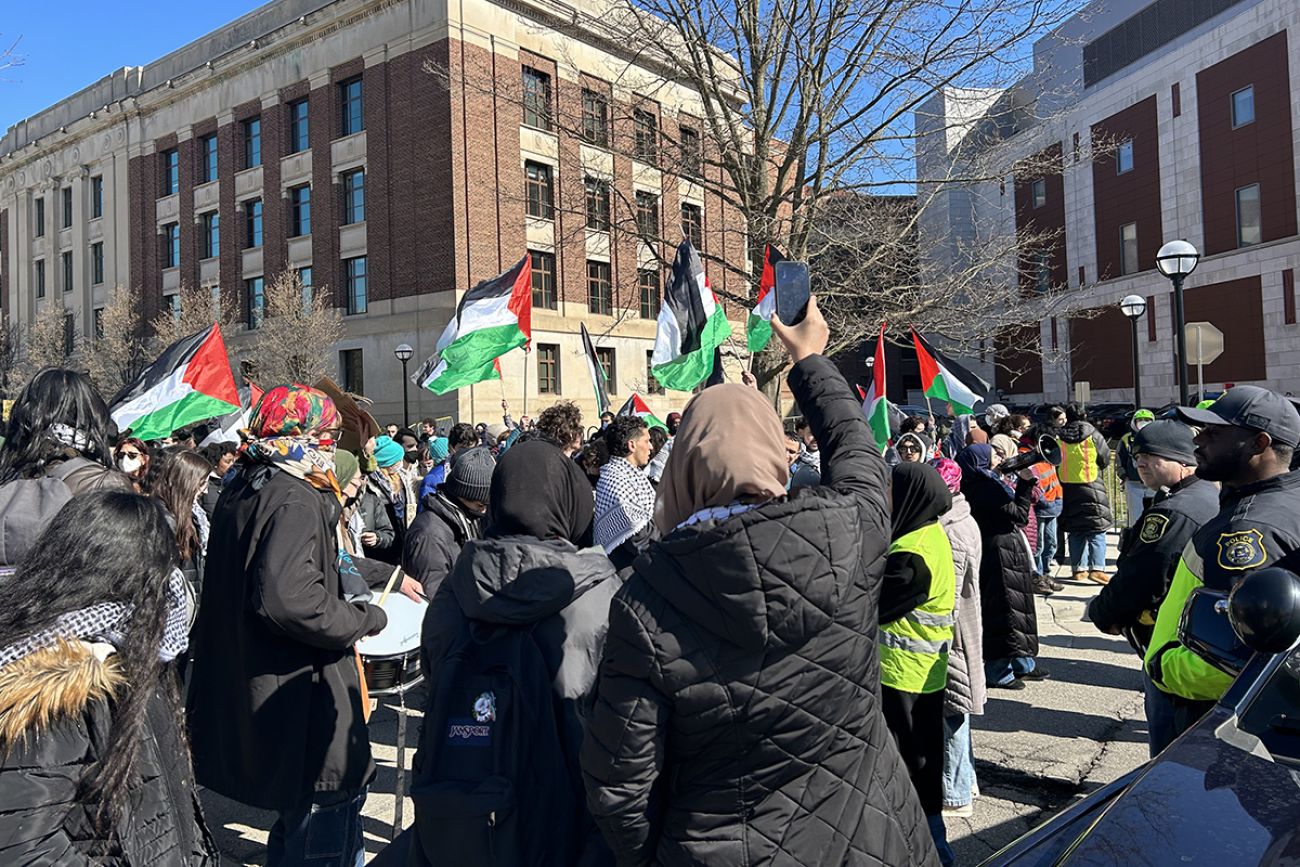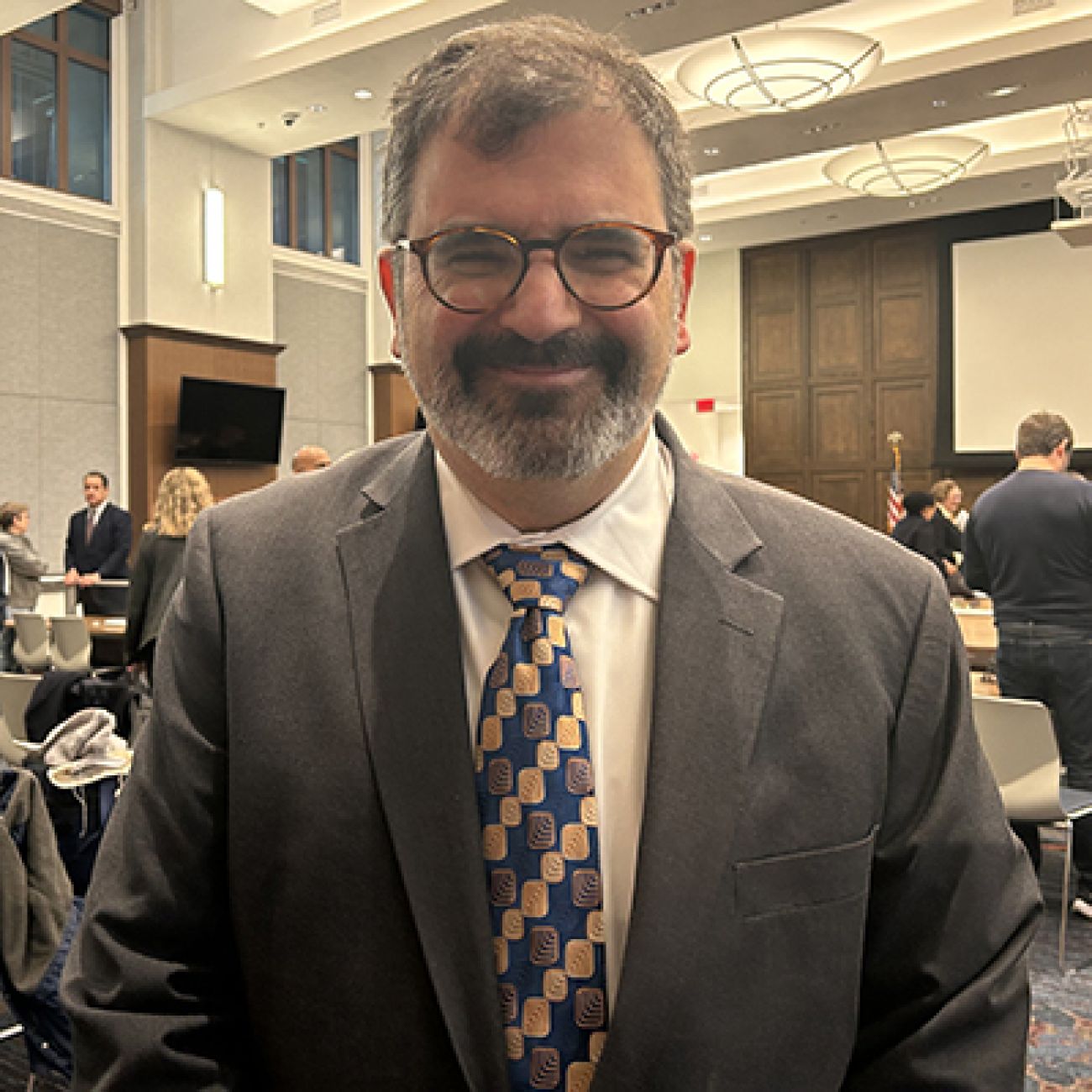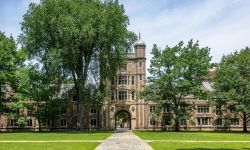U-M eyes ‘disruptive activity’ crackdown amid Israel-Hamas war protests

- The University of Michigan is considering a policy that would punish students and others who disrupt university operations
- The draft policy was released days after demonstrators disrupted a university honors event
- Some U-M students and others have called on the university to divest resources that directly or indirectly support Israel
ANN ARBOR — Amid growing campus protests over the Israel-Hamas war, the University of Michigan is considering a new policy to punish students, employees and visitors who disrupt school operations.
U-M announced the draft policy Wednesday after pro-Palestinian demonstrators interrupted a weekend honors convocation, forcing President Santa Ono to cut short a speech amid shouting.
“No one has the right to infringe on the exercise of others’ speech and activities by disrupting the normal celebrations, activities, and operations of the University,” the draft policy states.
Related:
- How Michigan schools are teaching the Israel-Hamas war (Very delicately)
- Michigan primary 2024: Crossover, ‘uncommitted’ efforts target Trump, Biden
- Michigan 2024 results: 13% of Democrats ‘uncommitted.’ Will it matter to Biden?
The proposal follows months of campus demonstrations about the Israel-Hamas war. A large coalition of student groups are calling on the university to end investments with any companies that have ties to Israeli military operations.
The draft policy drew swift criticism from students, including student body president Meera Herle, who during a Thursday board meeting said she thinks university regents are making decisions “from an emotionally-charged place.”
Herle said she is concerned leaders are attempting to change student conduct rules without using the proper processes.
“If you expect students to advocate in ways that you deem nondisruptive, I would implore you all to hold yourselves to higher standards and model respectful communication across differences,” Herle said.
The university is accepting feedback on the proposed policy through an online survey that will be available through April 3. But that “hastily” sent survey is “not a meaningful and constructive way to interact with students,” Herle added.
The university announced the draft policy one day after Ono sent an email to the community calling the weekend convocation demonstration “unacceptable.”
“We all must understand that, while protest is valued and protected, disruptions are not,” Ono wrote. “One group’s right to protest does not supersede the right of others to participate in a joyous event.”
Tina Al-khersan, a graduate of the law school, said Thursday that recent comments from university leaders could “psychologically and and physically endanger students.” She urged them to listen to students, staff, faculty and alumni.
“Instead of acknowledging legitimate student concerns, President Ono foreshadowed disciplinary actions for disrupting, and I quote, ‘a joyous event,’” Al-khersan said. “Let me be clear, there is no joy when a genocide is ongoing and the university is complicit.”
The Israel-Hamas war, which began in October, has prompted multiple campus demonstrations from students furious at Palestinian civilian deaths.
For months, protesters have called on the university to “divest” from Israel, including Thursday, when activists gathered outside of the board meeting with Palestinian flags.
The TAHRIR Coalition, a group of more than 90 student groups at U-M, asserts that the university “commits over $6 billion to investment managers who have profited from investments in Israeli companies and/or military contractors.”
Regent Michael Behm said it’s his understanding the university has not directly invested in any Israeli company but has investment funds that do. He told Bridge after the meeting that number equates to roughly $10 million.
Board of Regents Chair Sarah Hubbard said Thursday the university will not change its endowment investment decisions.
“We will continue to shield the endowment from political pressures and base our investment decisions on financial factors such as risk and return,” Hubbard said. “We are not moving to make any divestment of any kind from the university endowment.”
Under the “disruptive activity” policy proposed this week, protesters could face consequences for “obstructing lines of sight, making loud or amplified noises, projecting light or images, or otherwise creating substantive distractions.”
Potential punishments would differ for students, staff, faculty, contractors and visitors.
A student accused of violating the policy would be given a written notice of their alleged violation, have access to evidence and an optional hearing. Consequences could include a formal reprimand, restrictions from working at the university, removal from classes or activities, suspension or expulsion.
The draft policy announcement comes as university leaders plan for commencement events. Most graduation events take place in May but the university’s graduation event to celebrate LGBTQ+ students and allies and a College of Pharmacy event take place in April.
Behm, the U-M regent, told Bridge he would like to see a policy in place before graduation, but he wants to hear input first.

Asher Lopatin, a parent of two U-M students and the director of community relations for the Jewish Federation of Greater Ann Arbor, told Bridge he was “surprised” that leaders did not attempt to stop demonstrators on Sunday.
“At the end of the day, what bothers me is they let these protestors stop the ceremony, that’s not right,” he said.
“I just felt that we were robbed of something very special,” he said.
Lopatin supports the draft policy to curb disruptive activity, he told Bridge after Thursday’s board meeting.
“I want it to be a safe space for everyone and a place of free expression for everyone,” he said.
Michigan Education Watch
Michigan Education Watch is made possible by generous financial support from:
Subscribe to Michigan Education Watch
See what new members are saying about why they donated to Bridge Michigan:
- “In order for this information to be accurate and unbiased it must be underwritten by its readers, not by special interests.” - Larry S.
- “Not many other media sources report on the topics Bridge does.” - Susan B.
- “Your journalism is outstanding and rare these days.” - Mark S.
If you want to ensure the future of nonpartisan, nonprofit Michigan journalism, please become a member today. You, too, will be asked why you donated and maybe we'll feature your quote next time!






